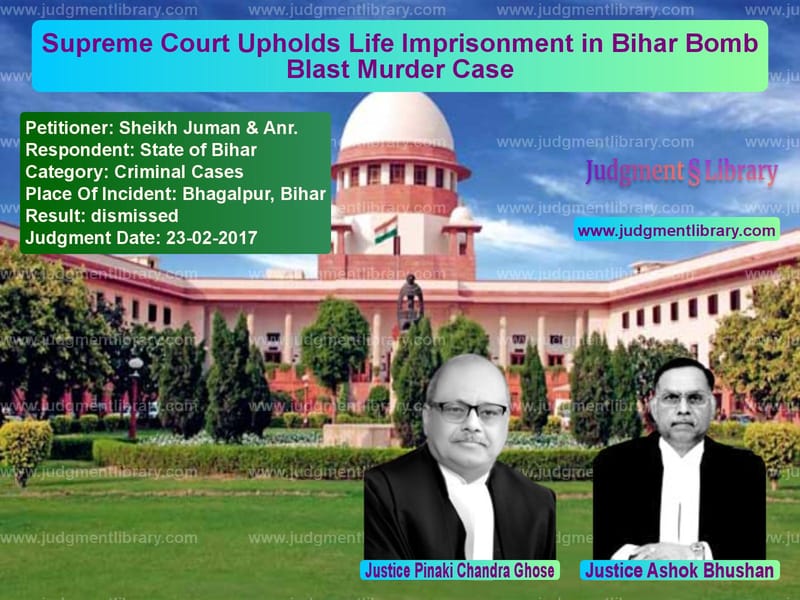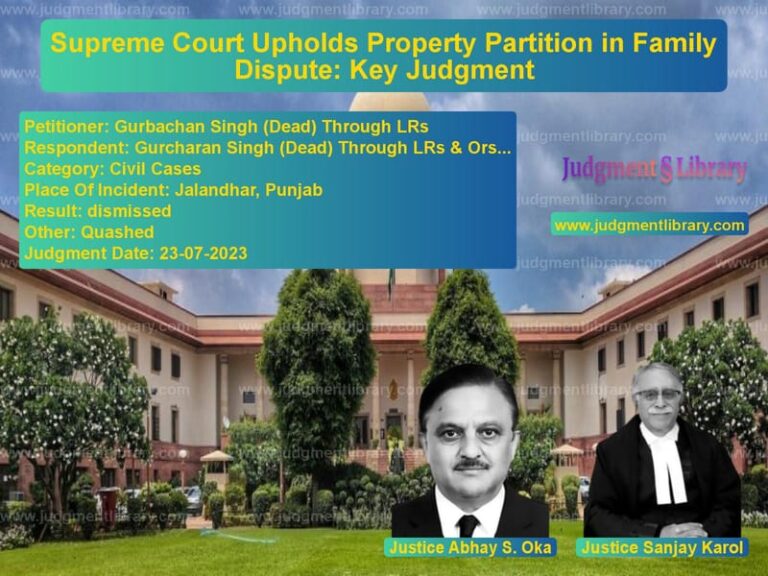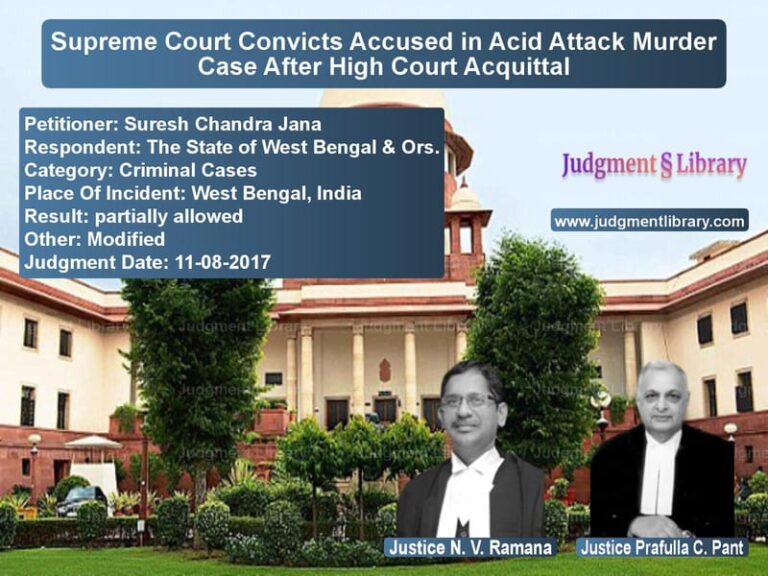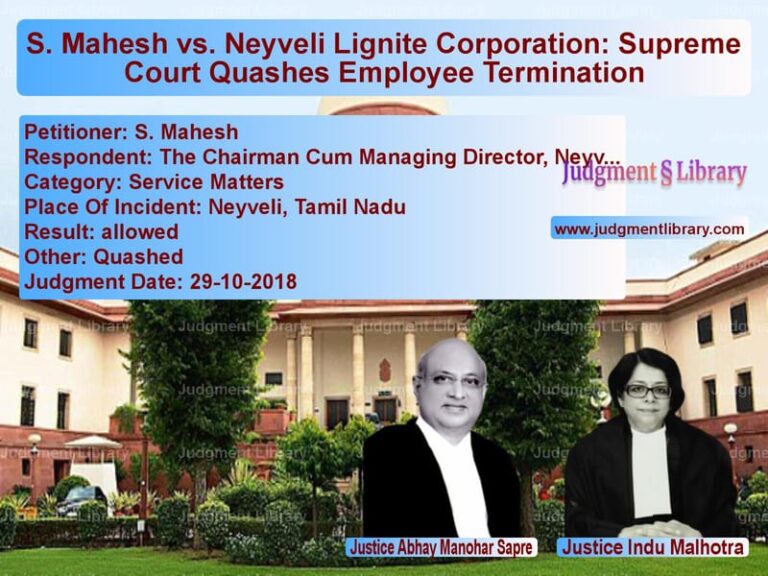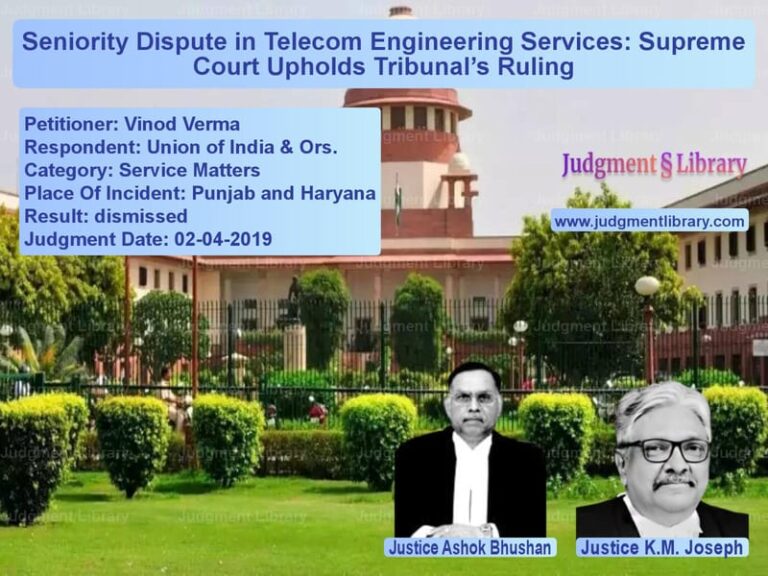Supreme Court Upholds Life Imprisonment in Bihar Bomb Blast Murder Case
Introduction
The Supreme Court of India, in the case of Sheikh Juman & Anr. v. State of Bihar, upheld the life imprisonment sentence awarded to the accused in a brutal double murder involving a bomb blast. The case, originating from a long-standing enmity, saw the appellants convicted for hurling explosives at two victims, resulting in their immediate death. The Court dismissed the appeals, reinforcing the principle that such violent crimes require strict legal consequences.
Background of the Case
The case involved a brutal attack on two individuals, Askari and Mohd. Asad, in Bhagalpur, Bihar. The key facts are as follows:
- On January 19, 1991, at around 6:00 PM, Askari was at his grocery shop when the accused, armed with bombs and guns, attacked him.
- Sheikh Shamsul, one of the accused, hurled a bomb at Askari, causing him to fall on the shop counter.
- Another accused, Sheikh Ashfaq, threw a second bomb at Askari’s chest, leading to his instant death.
- Mohd. Asad, hearing the explosion, ran towards the shop but was also attacked by a bomb thrown by Sheikh Gheyas.
- Mohd. Asad sustained critical injuries and was rushed to the hospital but succumbed on the same day.
The accused fled the scene, firing shots in the air to disperse witnesses. The victims’ family members filed an FIR against the assailants, leading to the prosecution.
Key Legal Issues Considered
The Supreme Court examined the following questions:
- Whether the High Court was justified in upholding the conviction and modifying the death sentence to life imprisonment.
- Whether the trial court’s reliance on eyewitness testimony was legally valid.
- Whether the appellants’ actions constituted a premeditated attack or a spontaneous crime.
Petitioner’s (Appellants’) Arguments
The appellants, through their legal counsel, argued:
- The prosecution’s case relied heavily on interested witnesses with a personal enmity against the accused.
- The failure to examine certain witnesses weakened the prosecution’s case.
- The crime did not fall within the category of ‘rarest of rare’ to justify a death sentence.
Respondent’s (Prosecution’s) Arguments
The state of Bihar, represented by counsel, countered:
- The attack was premeditated, with clear intent to kill, as bombs were used as weapons.
- Multiple eyewitnesses corroborated the prosecution’s case.
- The accused had a history of violent offenses and had previously been convicted in other homicide cases.
Supreme Court’s Observations
The Supreme Court upheld the conviction, making several key observations:
“The accused were part of an unlawful assembly with the common objective of eliminating the victims. The attack was not spontaneous but carefully orchestrated.”
The Court further observed:
“Conviction based on eyewitness testimony is legally sustainable when witnesses are found to be reliable and consistent.”
On the issue of sentence reduction, the Court noted:
“Given the circumstances and legal precedents, the High Court was justified in commuting the death sentence to life imprisonment.”
Final Judgment
The Supreme Court ruled:
- The appeals filed by the accused were dismissed.
- The conviction and life imprisonment sentence were upheld.
- The Court emphasized that bomb attacks resulting in multiple deaths warrant strict punishment.
Significance of the Judgment
This ruling has significant implications for criminal law:
- It reinforces the principle that violent, premeditated crimes must be dealt with strictly.
- It validates the reliance on eyewitness testimony in serious criminal cases.
- It affirms the role of the High Court in modifying death sentences in appropriate cases.
Implications for Criminal Law and Society
The judgment sets an important precedent:
- Unlawful assemblies engaging in violent crimes will face stringent legal consequences.
- High Courts retain the authority to commute death sentences based on legal precedents.
- Eyewitness testimony, when credible, remains a strong basis for conviction.
Conclusion
The Supreme Court’s decision in Sheikh Juman & Anr. v. State of Bihar ensures that justice is served in cases of extreme violence. By upholding life imprisonment, the ruling sends a strong message against premeditated crimes. The judgment sets a benchmark for future cases involving organized attacks and unlawful assemblies.
Don’t miss out on the full details! Download the complete judgment in PDF format below and gain valuable insights instantly!
Download Judgment: Sheikh Juman & Anr. vs State of Bihar Supreme Court of India Judgment Dated 23-02-2017.pdf
Direct Downlaod Judgment: Direct downlaod this Judgment
See all petitions in Murder Cases
See all petitions in Attempt to Murder Cases
See all petitions in Judgment by Pinaki Chandra Ghose
See all petitions in Judgment by Ashok Bhushan
See all petitions in dismissed
See all petitions in supreme court of India judgments February 2017
See all petitions in 2017 judgments
See all posts in Criminal Cases Category
See all allowed petitions in Criminal Cases Category
See all Dismissed petitions in Criminal Cases Category
See all partially allowed petitions in Criminal Cases Category

